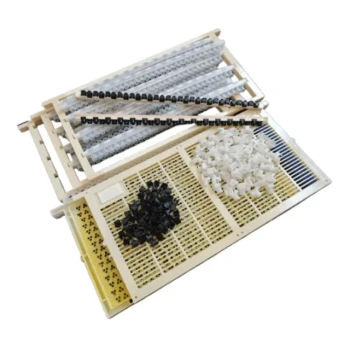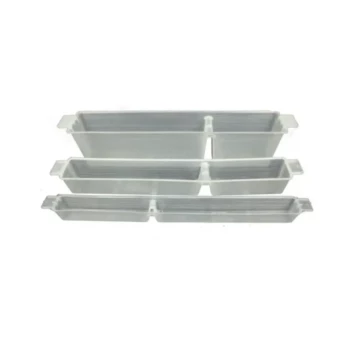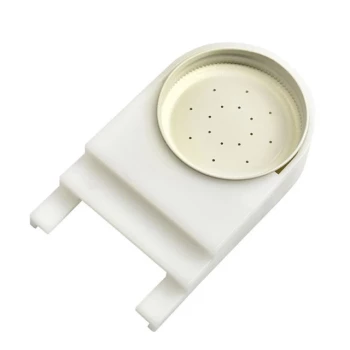In beekeeping, a nucleus colony (or "nuc") is a small, fully functional starter hive. It contains a queen, workers, and frames of brood and food, essentially serving as a miniature version of a full-sized colony. Beekeepers use nucs as an incredibly versatile tool for expanding an apiary, managing hive health, and recovering from unexpected problems.
A nucleus colony is more than just a way to start a new hive; it's a living resource that provides flexibility and insurance. Understanding its strategic value is key to moving from simply keeping bees to actively managing a resilient and productive apiary.
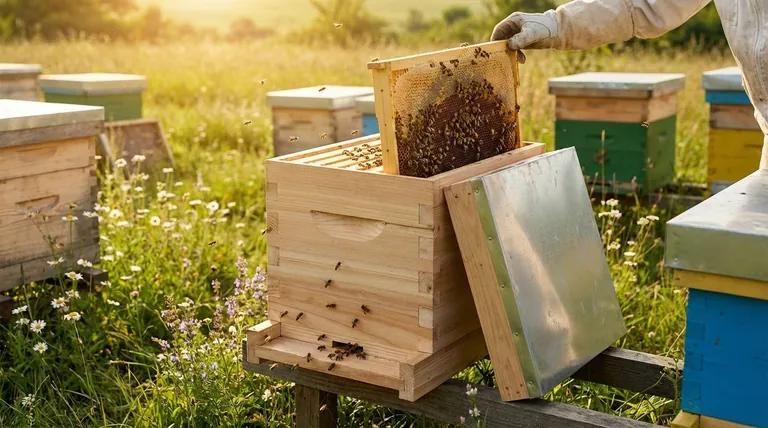
What Constitutes a Nucleus Colony?
A nuc is defined by its components, which together create a balanced, self-sufficient colony ready for growth.
A Complete Colony in Miniature
A true nuc contains all the elements of a full-sized hive. This includes a mated, laying queen, several thousand worker bees, and frames containing brood (eggs, larvae, and pupae) in various stages of development.
The Foundation of Brood and Resources
Unlike a "package" of bees, a nuc includes frames of drawn comb. These frames contain not only the developing brood but also stored resources like pollen and honey, giving the new colony a significant head start.
The Nuc Box
This miniature colony is housed in a smaller hive body called a nuc box. These boxes typically hold between three and five frames, providing a confined space that is easier for the small population of bees to manage and defend.
The Strategic Uses of a Nuc
The true power of a nuc lies in its flexibility. It is a fundamental management tool for both proactive and reactive beekeeping.
Creating New Hives
The most common use of a nuc is to start a new colony. Beekeepers can "split" a strong, populous hive by transferring a few frames of brood, bees, and a new queen into a nuc box, effectively creating two hives from one.
Preventing Swarms
Overcrowding is a primary trigger for swarming. By removing frames of brood and bees to create a nuc, a beekeeper can relieve this congestion, resetting the hive's impulse to swarm and preserving the workforce for honey production.
Emergency Queen Replacement
Having a nuc on hand is the best insurance policy against sudden queen failure or loss. If a production hive becomes queenless, the beekeeper can immediately introduce the queen and frames from the nuc, preventing a long, costly break in the brood cycle.
Bolstering Weak Colonies
A struggling or slow-to-build colony can be given a significant boost by adding a frame of capped brood from a healthy nuc. As these new bees emerge, they rapidly increase the hive's population and foraging capacity.
Housing Captured Swarms
When a beekeeper successfully captures a swarm, a nuc box provides the perfect temporary home. It gives the swarm a place to establish itself and allows the beekeeper to assess the queen's quality before moving them into a full-sized hive.
Understanding the Trade-offs: Nuc vs. Package
When starting a new hive, the choice often comes down to a nuc or a package of bees. Each has distinct advantages.
The Nuc Advantage: A Head Start
A nuc's primary advantage is its speed. With a laying queen and established brood, the colony can expand much more quickly than a package, which must draw all of its own comb from scratch. This often leads to a stronger first-year hive.
The Package Advantage: A Clean Slate
A package consists only of a queen and loose bees. Because it does not include comb from another hive, there is a lower risk of transferring pests or diseases, like Varroa mites. This "clean start" is a major consideration for biosecurity.
The Cost and Availability Factor
Nucs are generally more expensive than packages due to the included frames, comb, and brood. They are also typically available for a shorter window of time in the spring, as they depend on the buildup of the supplier's own hives.
Making the Right Choice for Your Goal
Your strategy should be guided by your specific objectives for the apiary.
- If your primary focus is rapid expansion and first-year honey production: A nuc provides the fastest path to a strong, productive colony.
- If your primary focus is minimizing disease risk or starting on a tighter budget: A package of bees offers a clean slate, though it requires more time to build up.
- If your primary focus is long-term apiary resilience: Maintaining one or more nucs throughout the season is the best insurance against unexpected queen loss or weak hives.
Ultimately, mastering the use of nucleus colonies transforms you from a bee-haver into a proactive and resilient beekeeper.
Summary Table:
| Aspect | Nucleus Colony (Nuc) | Package of Bees |
|---|---|---|
| Components | Laying queen, worker bees, frames of brood & food | Queen and loose bees only |
| Key Advantage | Head start with drawn comb and brood | Lower initial disease risk; clean slate |
| Best For | Rapid expansion, swarm prevention, queen insurance | Budget-conscious starts, minimizing disease transfer |
| Typical Cost | Higher | Lower |
Ready to build a more resilient and productive apiary?
HONESTBEE supplies commercial apiaries and beekeeping equipment distributors with the high-quality nucleus colonies and beekeeping supplies needed for strategic hive management. From durable nuc boxes to essential tools, we support your growth and success.
Contact HONESTBEE today to discuss your wholesale needs and strengthen your beekeeping operation.
Visual Guide
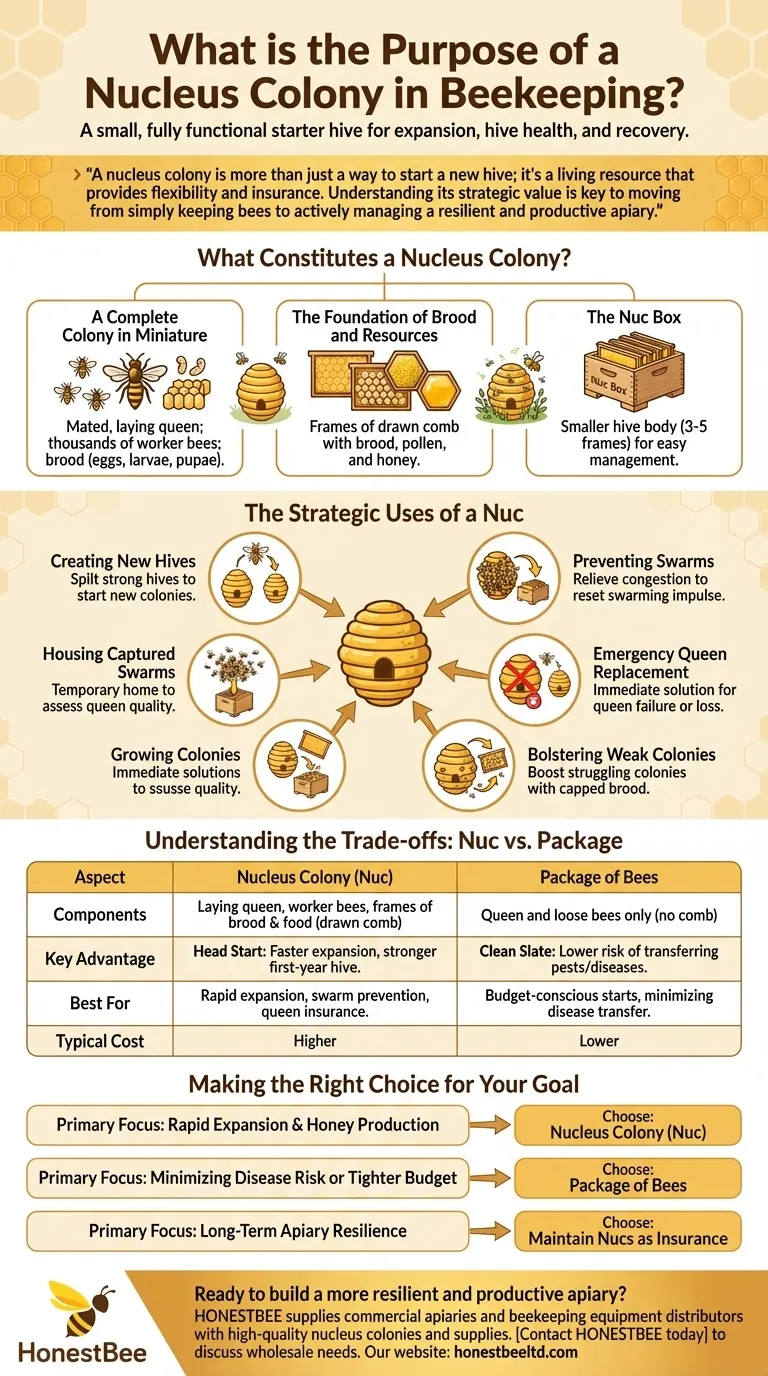
Related Products
- 5 Frame Wooden Nuc Box for Beekeeping
- Twin Queen Styrofoam Honey Bee Nucs Mating and Breeding Box
- Automatic Heat Preservation 6 Frame Pro Nuc Box for Honey Bee Queen Mating
- Plastic Transporting Bee Packages and Nuc Boxes for Beekeeping
- Portable Bee Mating Hive Boxes Mini Mating Nucs 8 Frames for Queen Rearing
People Also Ask
- What is the most common type of standard nuc? The 5-Frame Nuc Explained
- What is the advantage of overwintering a nucleus? A Strategic Asset for Beekeeping Success
- How should the nuc be installed in the apiary? Ensure Colony Success from Day One
- What are the benefits of moving nuclei around the apiary? Master Strategic Hive Management
- When can nucleus colonies (nucs) be created? Optimal Timing for Apiary Growth and Survival








